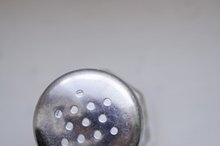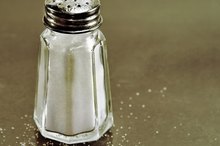A Low-Salt, Low-Fat & Low-Cholesterol Diet
The purpose of a low-salt, low-fat and low-cholesterol diet, often referred to as a heart-healthy diet, is to reduce the amount of cholesterol in your blood and also to prevent fluid retention. A low-salt, low-fat and low-cholesterol diet is generally recommended for someone with heart disease or with risk factors for heart disease, such as high blood pressure or high cholesterol.
Salt Restrictions
Although your body does need some sodium to function properly, most Americans consume well over the necessary amount. According to the University of California San Francisco Medical Center, the average American consumes 5 or more teaspoons of salt per day, which is 20 times the amount the body needs to function. Generally, a low-salt diet restricts sodium intake to less than 1,500 milligrams per day.
Processed foods and canned foods contribute a large amount of sodium to the diet. When following a low-salt diet, the majority of your diet should consist of fresh fruits and vegetables and homemade foods. Adding sodium-free spices and fresh herbs to foods during cooking instead of salt can also help reduce sodium intake.
- Although your body does need some sodium to function properly, most Americans consume well over the necessary amount.
- Generally, a low-salt diet restricts sodium intake to less than 1,500 milligrams per day.
Fat Recommendations
Foods Known to Damage the Liver
Learn More
A low-fat diet usually focuses on reducing the amount of saturated fat and trans fat in the diet, although it is important to control total fat intake as well. Total fat intake should not exceed 30 percent of calories. Saturated fat intake should be less than 7 percent of calories per day and trans fat intake should not exceed 1 percent of calories, although it is best to eliminate trans fat completely.
Most saturated fat comes from foods from animal sources, such as whole dairy products and meats. Trans fats come from partially hydrogenated oils found in processed foods and commercially baked foods. Fried foods also contain trans fat. When following a low-fat diet, eliminate these high-fat foods. Choose low-fat dairy and lean cuts of meat, such as chicken breast and fish. Avoid cooking with large amounts of butter or oils.
- A low-fat diet usually focuses on reducing the amount of saturated fat and trans fat in the diet, although it is important to control total fat intake as well.
Dietary Cholesterol
All of the cholesterol you need is made by your liver. Because of this, it is not necessary for your diet to contain any cholesterol. A low-cholesterol diet usually restricts dietary cholesterol intake to less than 300 milligrams per day. Egg yolks, fatty cuts of meat, organ meats, butter, full-fat dairy products and shellfish are regarded as high-cholesterol foods. When following a low cholesterol diet, avoid these foods.
- All of the cholesterol you need is made by your liver.
- Because of this, it is not necessary for your diet to contain any cholesterol.
Considerations
Is Hummus a Low-Cholesterol Food?
Learn More
While general recommendations can provide a guideline for following a low-salt, low-fat and low-cholesterol diet, specific recommendations may vary based on your health status and individual condition. Always follow your doctor or dietitian’s specific recommendations for sodium, fat and cholesterol.
Related Articles
References
Writer Bio
Lindsay Boyers has a Bachelor of Science in nutrition from Framingham State College and a certificate in holistic nutrition from the American College of Healthcare Sciences. She is also a licensed aesthetician with advanced training in skincare and makeup. She plans to continue on with her education, complete a master's degree program in nutrition and, ultimately, become a registered dietitian.









